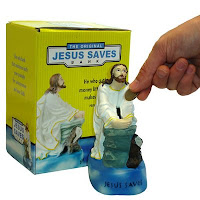 Following my last blog entry, I have started a web-search looking other similar items to the 'Jesus Adhesive Plaster' on sale in UK high streets. I found Jesus lip balm with the slogan, 'Looking Good for Jesus'. Jesus Bubble Bath declaring; ' Refresh, Renew - follow in his footsteps' and for economic tough times; 'Jesus Saves' money boxes.
Following my last blog entry, I have started a web-search looking other similar items to the 'Jesus Adhesive Plaster' on sale in UK high streets. I found Jesus lip balm with the slogan, 'Looking Good for Jesus'. Jesus Bubble Bath declaring; ' Refresh, Renew - follow in his footsteps' and for economic tough times; 'Jesus Saves' money boxes.True, the subject of money seems to pepper the gospel like no other topic and nothing seems to hold the attention as the value of currency either in our bank accounts or pockets.
Recently, Dr Rowan Williams attended A Common Word, a conference of Christian and Muslim scholars, aimed at promoting better understanding between the two faiths.
The scholars examined areas on which both faiths agree, such as the need to speak out against persecution of Christians in Iraq and other minorities around the world, including Iran.
But they also looked at the credit crunch from the perspective of Islam, which prohibits charging interest on lent money, and Christianity, which has changed its teaching to allow interest but still teaches against financial exploitation of the weak and vulnerable. Dr Williams said he would like to see a dialogue with Islam about what constituted a just and reasonable rate of interest. “The Christian tradition has always been cautious about interest.” For many centuries, it was at one with the traditional Muslim approach, he said.
This changed around the time of the 16th century he said. The question since then was to work out “just and proper” rates of interest, rather than go for absolute prohibition.
Dr Williams said: “I would like very much to see a dialogue developing with Islam about this question of what a just, a reasonable rate of interest might look like in the light of a religious ethic but this is a work very much in its infancy, to put it mildly,”I wonder, what does it mean when it says, Jesus Saves?





